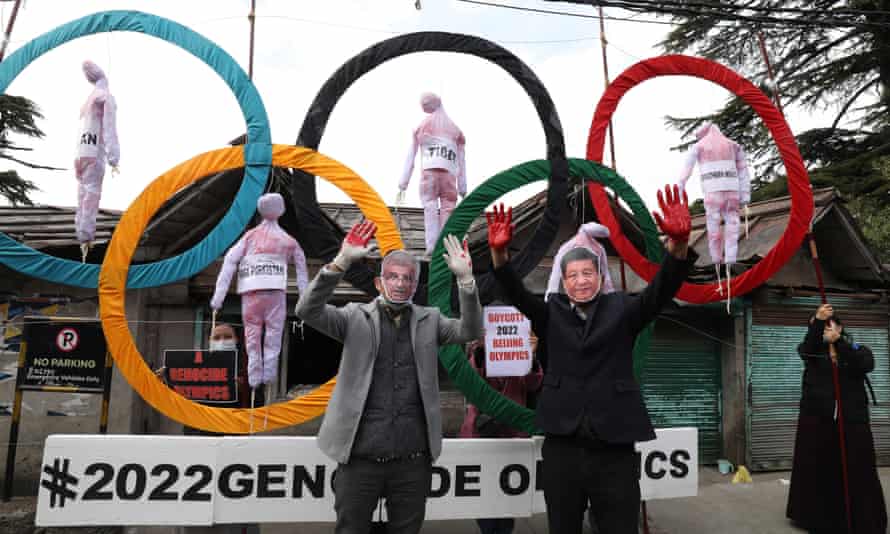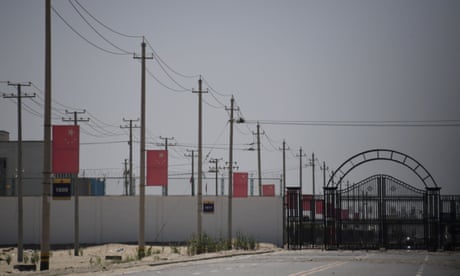Beijing 2022: 180 human rights groups call for Winter Olympics boycott
More than 180 organisations want countries to skip event as a way of demonstrating their opposition to China’s rights record

Last modified on Thu 4 Feb 2021 05.34 GMT
More than 180 human rights organisations have called for a boycott of the Beijing 2022 Winter Olympic Games in protest against China’s mass human rights abuses.
The coalition of groups – primarily regional associations in support of Tibet, Taiwan, the Uighur community and Hong Kong – said the hopes in 2015 that awarding Beijing the Games would be a catalyst for progress, had faded.
“Since then … President Xi Jinping has unleashed an unrelenting crackdown on basic freedom and human rights,” the group said, calling on governments to boycott the event to ensure it wasn’t used to “embolden” the Chinese government as they said the 2008 summer Olympics had done.
The open letter published this week said: “The IOC [ International Olympic Committee] refused to listen in 2008, defending its decision with claims that they would prove to be a catalyst for improved human rights. As human rights experts predicted, this decision proved to be hugely misplaced; not only did China’s human rights record not improve but violations increased substantially without rebuke.

“Now, in 2021, we find ourselves back in the same position with the IOC who are refusing to act despite the clear evidence of genocide and widespread and worsening human rights failures.”
China is under growing international pressure over its widely documented abuses and detention of Uighurs and other ethnic Muslims in Xinjiang, as well as its crackdown on dissent domestically and in Hong Kong, surveillance and enforced labour programmes in Tibet, suppression of language and culture in Inner Mongolia, and aggressive posturing towards Taiwan.
In recent years its government and senior officials have been subjected to various sanctions and multilateral statements of condemnation, which have done little to change the behaviour.
But there appears little appetite from countries for a boycott, including in the US, which has formally declared that China’s abuses in Xinjiang to amount to genocide.
“We’re not currently talking about changing our posture or our plans as it relates to the Beijing Olympics,” White House spokesperson Jen Psaki said on Wednesday.
The US Olympic and Paralympic Committee said it believed it was more effective for governments to engage China directly on human rights concerns, and boycotts “have been shown to negatively impact athletes while not effectively addressing global issues”.
Asked about the letter, China’s foreign ministry spokesperson, Wang Wenbin, said at a regular press briefing “all Winter Games lovers are looking forward to taking part in the Beijing 2022 Winter Olympics”.
“We are fully confident the Beijing Winter Olympics will be a splendid event. In the meantime I must point out that it is highly irresponsible for some parties to try and disrupt, intervene, and sabotage the preparation and holding of the Beijing Winter Olympic Games to serve their political interests,” Wang said.
“Such actions will not be supported by the international community and will never succeed.”
It came as Human Rights Watch (HRW) accused the IOC of failing its due diligence in not conducting a human rights risk assessment.
“The IOC knows the Chinese authorities are arbitrarily detaining Uighurs and other Muslims, expanding state surveillance, and silencing numerous peaceful critics,” said Sophie Richardson, HRW’s China director. “Its failure to publicly confront Beijing’s serious human rights violations makes a mockery of its own commitments and claims that the Olympics are a ‘force for good’.”
No comments:
Post a Comment